- Clone
- TN3-19.12 (See other available formats)
- Regulatory Status
- RUO
- Other Names
- Tumor necrosis factor-α, Cachectin, Necrosin, Macrophage cytotoxic factor (MCF), Differentiation inducing factor (DIF), TNFSF-2
- Isotype
- Armenian Hamster IgG
- Ave. Rating
- Submit a Review
- Product Citations
- publications
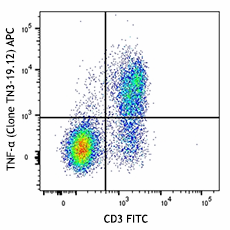
-

C57BL/6 splenocytes were stimulated with Cell Activation Cocktail (with Brefeldin A, Cat# 423303 ) for 6 hours, fixed, permeabilized (Fixation Buffer Cat# 420801, Permeabilization Wash Buffer Cat# 421002), and then stained with TNF-α (clone TN3-19.12) APC (top) or Armenian Hamster IgG APC (bottom). -

| Cat # | Size | Price | Quantity Check Availability | Save | ||
|---|---|---|---|---|---|---|
| 506107 | 25 µg | 82€ | ||||
| 506108 | 100 µg | 228€ | ||||
TNF-α is secreted by macrophages, monocytes, neutrophils, T-cells, and NK-cells. Many transformed cell lines also secrete TNF-α. Monomeric mouse TNF-α is 156 amino acid protein (N-glycosylated) with a reported molecular weight of 17.5 kD protein. TNF-α forms multimeric complexes; stable trimers are most common in solution. A 26 kD membrane form of TNF-α has also been described. TNF-α binding to surface receptors elicits a wide array of biologic activities including: cytolysis and cytostasis of many tumor cell lines in vitro, hemorraghic necrosis of tumors in vivo, increased fibroblast proliferation, and enhanced chemotaxis and phagocytosis in neutrophils. The TN3-19.12 antibody reacts with mouse, rat, and rabbit tumor-necrosis factor-α (TNF-α) proteins. The TN3-19.12 antibody can neutralize the bioactivity of natural or recombinant TNF-α.
Product DetailsProduct Details
- Verified Reactivity
- Mouse, Rat
- Reported Reactivity
- Rabbit
- Antibody Type
- Monoclonal
- Host Species
- Armenian Hamster
- Immunogen
- E. coli-expressed, recombinant mouse TNF-α
- Formulation
- Phosphate-buffered solution, pH 7.2, containing 0.09% sodium azide.
- Preparation
- The antibody was purified by affinity chromatography and conjugated with APC under optimal conditions.
- Concentration
- 0.2 mg/ml
- Storage & Handling
- The antibody solution should be stored undiluted between 2°C and 8°C, and protected from prolonged exposure to light. Do not freeze.
- Application
-
ICFC - Quality tested
- Recommended Usage
-
Each lot of this antibody is quality control tested by intracellular immunofluorescent staining with flow cytometric analysis. For flow cytometric staining, the suggested use of this reagent is ≤0.25 µg per million cells in 100 µl volume. It is recommended that the reagent be titrated for optimal performance for each application.
- Excitation Laser
-
Red Laser (633 nm)
- Application Notes
-
ELISA or ELISPOT Capture1: The Ultra-LEAF™ Purified TN3-19.12 antibody is useful as the capture antibody in a sandwich ELISA or ELISPOT assay, when used in conjunction with biotinylated Poly5160 antibody (Cat. No. 516003) as the detecting antibody for detecting mouse/rat TNF-a. The Ultra-LEAF™ purified antibody is suggested for ELISPOT capture.
Clone TN3-19.12 has been shown to neutralize murine TNF-a and cross reacts wtih mouse TFN-ß1. The Ultra-LEAF™ Purified antibody (Endotoxin < 0.01 EU/µg, Aside free, 0.2 µm filtered) is recommended for neutralization (Cat. Nos. 506109 - 506114). -
Application References
(PubMed link indicates BioLegend citation) -
- Sheehan, K., et al. 1989. J. Immunol. 142:3884. (Neut)
- Merrick, B.A., et al. 1992. Appl. Theor. Electrophor 2:177.
- Takahashi, S., et al. 1995. Brain Res 690:241.
- Rabinovich, R., et al. 1993. J. Pharmacol. Exp. Ther. 267:1550.
- Molloy, R., et al. 1993. J. Immunol. 151:2142.
- Finkelman, F., et al. 2003. Curr. Prot. Immunol. John Wiley & Sons, New York. Unit 6.28.
- Simkins, HM., et al. 2011. J. Leukoc Biol. 89:753. PubMed.
- Faas MM, et al. 2003. J. Reprod. Immunol. 1:39-52.
- Product Citations
-
- RRID
-
AB_2721314 (BioLegend Cat. No. 506107)
AB_2721314 (BioLegend Cat. No. 506108)
Antigen Details
- Structure
- TNF superfamily; dimer/trimer; 18-150 kD (Mammalian)
- Bioactivity
- Paracrine/endocrine mediator of inflammatory and immune functions; selectively cytotoxic for transformed cells; endothelial cell alterations; chemoattractant
- Cell Sources
- Activated monocytes, neutrophils, macrophages, T cells, B cells, NK cells, LAK cells
- Cell Targets
- Monocytes, neutrophils, macrophages, T cells, fibroblasts, endothelial cells, osteoclasts, adipocytes, astroglia, microglia
- Receptors
- TNFRSF1A (TNF-R1, CD120a, TNFR-p60 Type β, p55); TNFRSF1B (TNF-R2, CD120b, TNFR-p80 Type A, p75)
- Cell Type
- Tregs
- Biology Area
- Immunology, Innate Immunity
- Molecular Family
- Cytokines/Chemokines
- Antigen References
-
1. Fitzgerald, K., et al. Eds. 2001. The Cytokine FactsBook. Academic Press, San Diego.
2. Beutler, B., et al. 1988. Annu. Rev. Biochem. 57:505.
3. Beutler, B., et al. 1989. Annu. Rev. Immunol. 7:625.
4. Tracey, K., et al. 1993. Crit. Care Med. 21:S415. - Regulation
- Type II integral membrane protein processed by TACE for secretion; upregulated by interferons, IL-2, GM-CSF, substance P, bradykinin, PAF, immune complexes, cyclooxygenase; downregulated by IL-6, TGF-β, vitamin D3, prostaglandin E2, PAF antagonists,
- Gene ID
- 21926 View all products for this Gene ID 24835 View all products for this Gene ID
- Specificity (DOES NOT SHOW ON TDS):
- TNF-alpha
- Specificity Alt (DOES NOT SHOW ON TDS):
- TNF-α
- App Abbreviation (DOES NOT SHOW ON TDS):
- ICFC
- UniProt
- View information about TNF-alpha on UniProt.org
Related FAQs
Other Formats
View All TNF-α Reagents Request Custom Conjugation| Description | Clone | Applications |
|---|---|---|
| PE anti-mouse / rat TNF-α | TN3-19.12 | ICFC |
| Purified anti-mouse / rat TNF-α | TN3-19.12 | ELISA Capture,IP,WB |
| APC anti-mouse/rat TNF-α | TN3-19.12 | ICFC |
| Ultra-LEAF™ Purified anti-mouse/rat TNF-α | TN3-19.12 | ELISA Capture,ELISPOT Capture,ICFC,IP,Neut,WB |
Customers Also Purchased
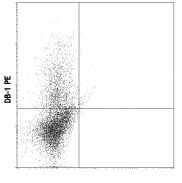
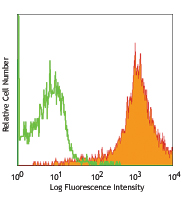
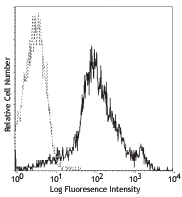
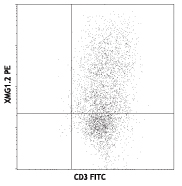
Compare Data Across All Formats
This data display is provided for general comparisons between formats.
Your actual data may vary due to variations in samples, target cells, instruments and their settings, staining conditions, and other factors.
If you need assistance with selecting the best format contact our expert technical support team.
-
PE anti-mouse / rat TNF-α
-
Purified anti-mouse / rat TNF-α
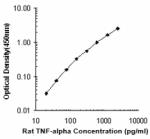
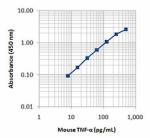
-
APC anti-mouse/rat TNF-α
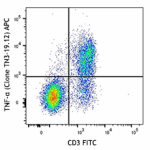
C57BL/6 splenocytes were stimulated with Cell Activation Coc... 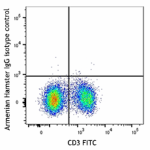
-
Ultra-LEAF™ Purified anti-mouse/rat TNF-α
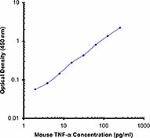
 Login / Register
Login / Register 














Follow Us